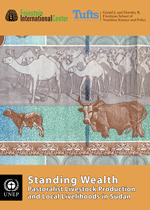This report highlights the importance of pastoralist livestock production for the country’s economy, and outlines ways in which pastoralism can be supported in the future, to benefit livelihoods and the economy of Sudan. The economic value of pastoral livestock production is largely hidden, both in the official statistics, and in relation to the domestic market and subsistence economy (e.g. milk). The report argues for an informed, effective and equitable integration of pastoral systems within national policy and legal frameworks, in order to legitimate this form of land use and to underpin a more constructive approach to modernization of the livestock sector.
Findings from the report indicate that unleashing the potential of the livestock sector in Sudan requires securing the conditions for livestock mobility, so that livestock can access pastures selectively, when the nutritional value of plants is at their peak. This requires the return of security in pastoral areas and along livestock routes, and a tailored regulation of markets in land (in pastoral areas), water for livestock, and crop residues.
This report is based on extensive fieldwork carried out in North Kordofan, with three case studies on sheep, cattle and camel production systems. Additional visits were made to West Darfur State, Gadarif and Omdurman during 2012.
Click here to download the appendices.
Click here to read the briefing paper in English.
To read the briefing paper in Arabic, click here.







